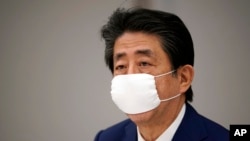Japanese Prime Minister Shinzo Abe has formally declared a 30-day state of emergency in Tokyo and other parts of the country in response to the rising cases of coronavirus.
Prime Minister Abe issued the declaration Tuesday during a nationally-televised speech.
The emergency decree, which will expire on May 6, covers the capital and six other prefectures, including the central port city of Osaka.
The declaration will give local authorities the legal power to call on its citizens to stay at home and to ask schools and businesses to close, but stops short of imposing a legally binding nationwide lockdown. Japan’s post-World War II constitution, which weighs heavily in favor of civil liberties, does not empower the government to impose a mandatory quarantine.
Abe also announced Tuesday that the Cabinet had formally approved a $990 billion stimulus bill to blunt the economic downturn caused by the pandemic, including $55 billion in direct payments to households and small businesses.
Abe has been reluctant to invoke a state of emergency, but appears to have been prompted to move after Tokyo reported 143 new cases reported Sunday, the largest number of confirmations in a single day, bringing the total number of cases in the capital to over 1,000.
Nationally, there are about 3,900 confirmed cases of novel coronavirus, including more than 90 fatalities.





